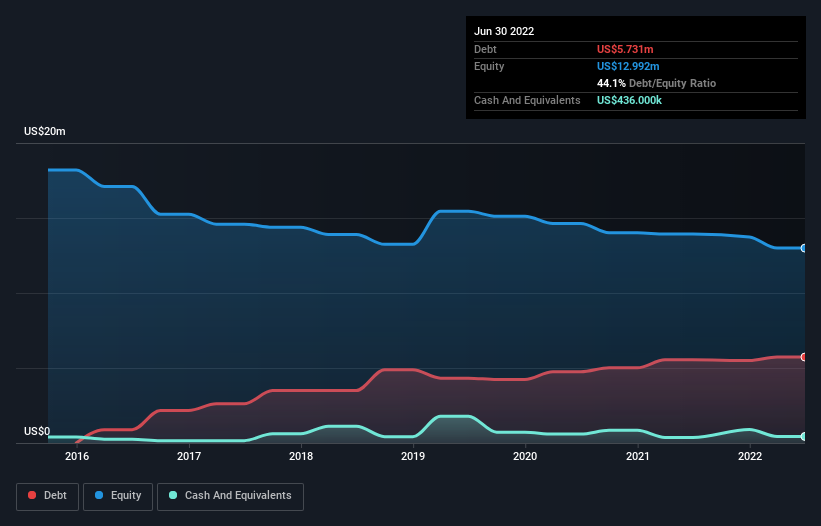The external fund manager backed by Berkshire Hathaway's Charlie Munger, Li Lu, makes no bones about it when he says 'The biggest investment risk is not the volatility of prices, but whether you will suffer a permanent loss of capital.' So it might be obvious that you need to consider debt, when you think about how risky any given stock is, because too much debt can sink a company. We note that Ncondezi Energy Limited (LON:NCCL) does have debt on its balance sheet. But the more important question is: how much risk is that debt creating?
When Is Debt A Problem?
Debt assists a business until the business has trouble paying it off, either with new capital or with free cash flow. If things get really bad, the lenders can take control of the business. However, a more usual (but still expensive) situation is where a company must dilute shareholders at a cheap share price simply to get debt under control. By replacing dilution, though, debt can be an extremely good tool for businesses that need capital to invest in growth at high rates of return. The first step when considering a company's debt levels is to consider its cash and debt together.
See our latest analysis for Ncondezi Energy
What Is Ncondezi Energy's Net Debt?
The chart below, which you can click on for greater detail, shows that Ncondezi Energy had US$5.73m in debt in June 2022; about the same as the year before. On the flip side, it has US$436.0k in cash leading to net debt of about US$5.30m.

A Look At Ncondezi Energy's Liabilities
Zooming in on the latest balance sheet data, we can see that Ncondezi Energy had liabilities of US$6.04m due within 12 months and no liabilities due beyond that. Offsetting this, it had US$436.0k in cash and US$74.0k in receivables that were due within 12 months. So its liabilities total US$5.53m more than the combination of its cash and short-term receivables.
Given this deficit is actually higher than the company's market capitalization of US$4.66m, we think shareholders really should watch Ncondezi Energy's debt levels, like a parent watching their child ride a bike for the first time. In the scenario where the company had to clean up its balance sheet quickly, it seems likely shareholders would suffer extensive dilution. The balance sheet is clearly the area to focus on when you are analysing debt. But it is Ncondezi Energy's earnings that will influence how the balance sheet holds up in the future. So when considering debt, it's definitely worth looking at the earnings trend. Click here for an interactive snapshot.
Given its lack of meaningful operating revenue, Ncondezi Energy shareholders no doubt hope it can fund itself until it can sell some combustibles.
Caveat Emptor
Importantly, Ncondezi Energy had an earnings before interest and tax (EBIT) loss over the last year. Indeed, it lost a very considerable US$1.7m at the EBIT level. Considering that alongside the liabilities mentioned above make us nervous about the company. We'd want to see some strong near-term improvements before getting too interested in the stock. Not least because it burned through US$1.3m in negative free cash flow over the last year. That means it's on the risky side of things. There's no doubt that we learn most about debt from the balance sheet. But ultimately, every company can contain risks that exist outside of the balance sheet. For instance, we've identified 3 warning signs for Ncondezi Energy that you should be aware of.
If you're interested in investing in businesses that can grow profits without the burden of debt, then check out this free list of growing businesses that have net cash on the balance sheet.
New: Manage All Your Stock Portfolios in One Place
We've created the ultimate portfolio companion for stock investors, and it's free.
• Connect an unlimited number of Portfolios and see your total in one currency
• Be alerted to new Warning Signs or Risks via email or mobile
• Track the Fair Value of your stocks
Have feedback on this article? Concerned about the content? Get in touch with us directly. Alternatively, email editorial-team (at) simplywallst.com.
This article by Simply Wall St is general in nature. We provide commentary based on historical data and analyst forecasts only using an unbiased methodology and our articles are not intended to be financial advice. It does not constitute a recommendation to buy or sell any stock, and does not take account of your objectives, or your financial situation. We aim to bring you long-term focused analysis driven by fundamental data. Note that our analysis may not factor in the latest price-sensitive company announcements or qualitative material. Simply Wall St has no position in any stocks mentioned.
About AIM:SGN
Solgenics
Solgenics Limited operates as a power supply solutions company in Africa.
Slightly overvalued with worrying balance sheet.
Market Insights
Community Narratives



